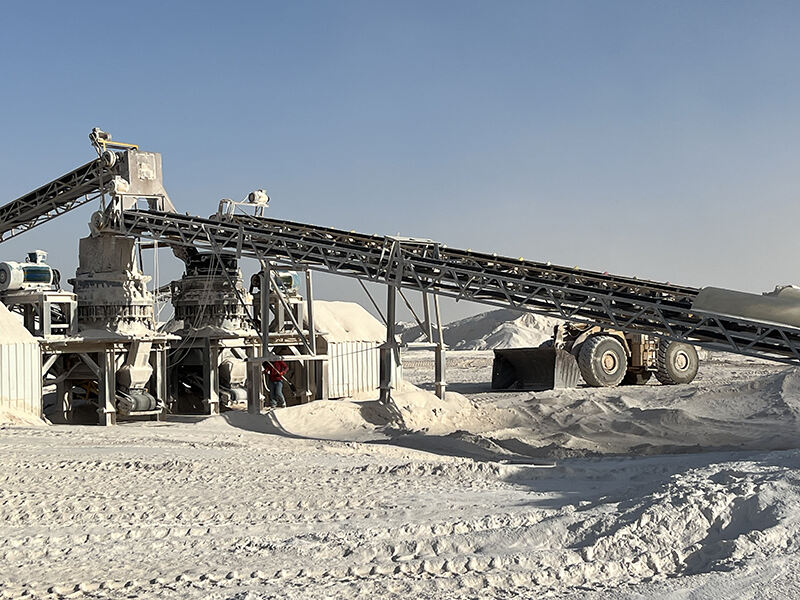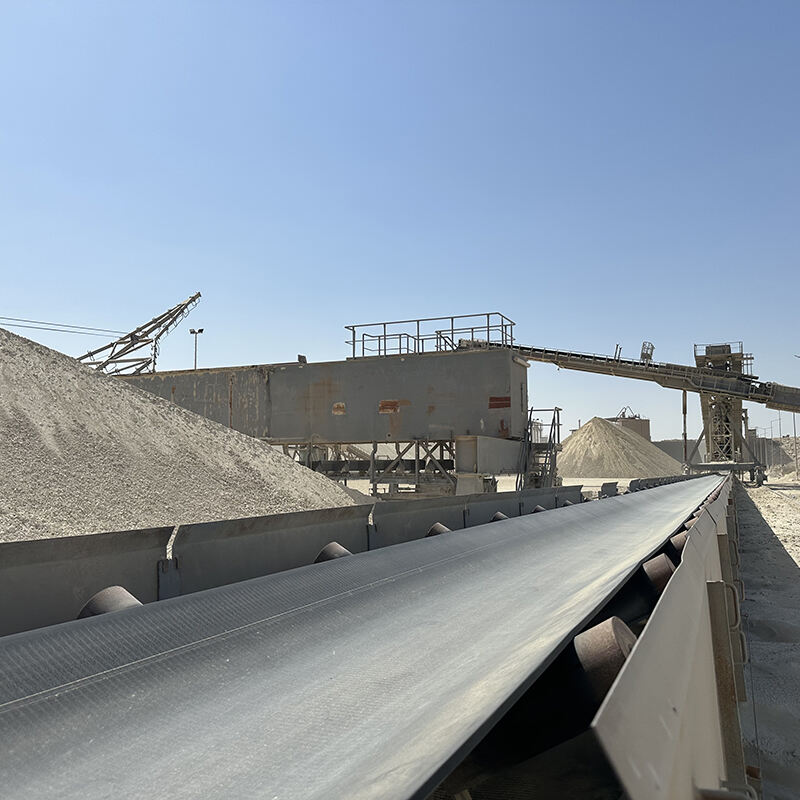
Prevádzka lomu je ťažká práca, ale udržiavanie bezpečnosti na mieste a bezpečných postupov s vaším vybavením na spracovanie materiálov je jednou z najdôležitejších stránok. Prievozné páse, valce, obrazovky – každé z týchto vybavení je neobyčajne dôležité pre produkčný proces. Správna údržba predĺží životnosť vybavenia a zníži pravdepodobnosť jeho zlyhania, pričom slúži aj ako spôsob kontroly nákladov. Tu vás budeme vedieť cez kritické postupy údržby, ktoré pomáhajú maximalizovať produktivitu vašeho lomového vybavenia.
1. VAŠA PRVÁ LÍNIA OBRANY: DENNÉ INŠPEKCIE
Hlavný dôvod konania údržby: Pravidelná údržba je dôležitá na zistenie problémov pred tým, než sa stanú drahými problémami. Vytvorte kontrolný zoznam, ktorý majú každý deň dodržiavať členovia tímu. Skontrolujte prievodicovú pásku na opotrebovanie, nesprávne zarovnanie a poškodenie jej povrchu. Valce musia byť schopné rotovať bez prekážok a majú byť skontrolované na trhliny, zácpa alebo volné šrouby.
Malé problémy zistené včas vám umožnia plánovať krátke opravy počas plánovaného vypnutia, namiesto toho, aby ste sa brodili neplánovanými vypnutiami a príslušnými lahami vo vašej celkovosti produktivity.
2. Mazanie: Zníženie trenia a Nosia
Právny maženie je jednou z najlepších metód na udržanie dolného vybavenia v dobrom stave. Tento trenie medzi pohyblivými časťami nevyhnutne spôsobí, že tieto oblasti budú vyvíjať viac tepla, čo spôsobí, že motové olej a postihnuté komponenty sa porušia rýchlejšie, ako bolo zamýšľané. Postupujte podľa pokynov výrobcu pri mažení prevádzkových valcov, ložíska a lavičiek s ekvivalentným mažiacim materiálom pre každú časť.
Okrem zníženia trenia slúži maživo aj na ochranu pred vlhkosťou a prachom, ktoré sú v dole všade prisutné. Udržiavajte rozvrh maženia a dodržiavajte ho - práve táto malá miera údržby veľmi pomôže pri predlĺžení životnosti vašeho vybavenia.
3. Kedy Zmeniť ČASTI: NIKDY NESKOR V ÚDRŽBE VAŠEHODOĽNÉHO VYBAVENIA môže mať drahý dlhodobý beh a stáť veľa peňazí.
Ako môžu pásy, valce a obrazovky... ktoré sa s časom opotrebia. Keby sme čakali, kým tieto komponenty zlyhajú, spôsobilo by to veľmi nákladné a predĺžené výpady. Namiesto toho prejavte iniciatívu a menajte opotrbivé časti v pravidelných intervaloch, ktoré sú založené na použití vašeho zariadenia a operačnom prostredí.
Toto zahŕňa, napríklad, vizuálnu kontrolu pásov s ohľadom na opotrebenie alebo rozťaženie. S časom sa môžu vaše valce opotrebovať a spôsobiť, že sa pás posunie alebo sa nezarovná (alebo dokonca prehrije). Skontrolujte obrazovky na poškodenie a/alebo zatkanie, a ak je potreba, ich nahraďte, aby sa zabezpečil hladký prietok materiálov. Časové zmenu opotrbivých častí môže zabrániť náhlej poruche vašeho zariadenia a bude efektívnejšie.
4. Pozadie a Časové rozvrhnutie — Pridanie všetkých kolies do sústavy
Keď ide o prevádzkové pásy a sieťové siete, chcete mať obe správne zarovnané s pravou miarou napätia. Dokonca aj najmenšie odchýlky v zarovnaní môžu spôsobiť, že sa pásy posunú, začnú sa opáliť okolo hrán a spôsobia vedľajšiu škodu na susedných komponentoch. Nesprávne napätá sieť môže spôsobiť, že sa materiál nachádza blízko paluby, čo znamená zníženú účinnosť a nadmerné manipulovanie s mechanickými aspektmi, čo viedlo k chudobnejšiemu výkonu.
Skontrolujte zarovnanie často a upravte ho, ak je to potrebné. Použite laserový nástroj na zarovnanie na kontrolu alebo prezarovnanie prevádzkových pásov pre presnosť a aby sa zabezpečilo, že napätie pása je vhodné pre nesenenú hmotnosť. Overte si, či sú obrazovky pevne montované a či je napätie rovnaké po celej ploche panelov.
5. Zachovanie toho Čistota a Čistota: Predchádzanie sa nahromažďovaniu materiálu alebo prekážok
Prach, škriatky a odpad môžu ovplyvniť výkon ťažkej techniky v lomoch. Keď sa na vašom pečiacej grilliakumuluje príliš veľa toho, nie len pridá dodatočný stress určitým častiám, ale tiež zvyšuje riziko zaseknutia alebo prehrievania a nebezpečenstvo veľkej požiarovej havárie môže nastať kedykoľvek. Aby ste tieto problémy vyriešili, stanovte úklonový program, ktorý bude zahŕňať odstránenie nánosov materiálu z prevádzkových valcov, pásov a sieiek.
Používajte vzduchové fičiace, štetky, ak je potrebné, a stlačenú vodu na uistenie, že všetky oblasti sprístely sprístely. V spôsobe všeobecne viac pozorne identifikujte priestor blízko ložisk a kolies a motorov, pretože tento miesto sa ľahko naplní odpadmi, čo spôsobuje rýchle poruchy vybavenia.
6. Monitorovať Elektrické Komponenty: Nechajte zapnutú energiu
Elektrické motory pohania mnoho funkcií priamo na těžobnom stroje. Pravidelne skontrolujte zásuvky, dráty a motory na príznaky nosnosti alebo poškodenia. Vymenite unavené dráty a uistite sa, že všetky spojenia sú pevne zakotvené, aby ste predchli elektrickým pretekám, ktoré môžu poškodiť zariadenie alebo spôsobiť neočakávané vypnutie.
Jednou z najlepších metód, ako tieto náklady vyhnúť, je implementácia prediktívneho údržbového programu pre vaše elektrické komponenty. Pravidelné utiahnutie spojení a vymenia poškodených káblov môže veľmi pomôcť predchádzať poruchám motorov.
7. Školenie pre operátorov zvyšovať kvalifikáciu vašich ľudí
Dobre vycvičení operátori významne prispevajú k údržbe zariadenia a predĺžia jeho životnosť. Vaša tíma by mala chápať význam každodenných operácií a byť vycvičená na to, aby rozpoznala varovné známky, kým nestanú vážnymi problémami. Pravidelnými školeniami môžu posilňovať najlepšie postupy a pri neopárnych okolnostiach predstaviť nové údržbовé techniky.
Vyškolenie vašich operátorov písomnými pokynmi, ako napríklad údržobnými rozpismi a postupmi. Poskytnutím vašim operátorom potrebných poznatkov a nástrojov výrazne znížite počet chýb späť operátora, čo viede k dlhšej životnosti vybavenia.
Záver
Zabezpečenie dlhej životnosti toho, čo je navrhnuté do systémov pre spracovanie materiálov na vápenci znamená ich pravidelnú údržbu. Konzistentné denné kontroly, maštovanie hybúcich sa častí, nahradenie opotriebovaných komponentov a zabezpečenie správneho zarovnania udržia minimálne čas nefunkčnosti vybavenia, avšak tiež znížia vaše prevádzkové náklady a pomôžu udržať efektívnu a produktívnu prevádzku. Vždy zvažujte dlhodobý pohľad; dobre udržované vybavenie je lepšie spustiteľné, bezpečnejšie a ekonomičnejšie.
Implementáciou týchto otestovaných tipov pre údržbu môžete zabezpečiť, aby váš vápenec nikdy neprestal byť dokonale naladenou mašinou.
Obsah
- 1. VAŠA PRVÁ LÍNIA OBRANY: DENNÉ INŠPEKCIE
- 2. Mazanie: Zníženie trenia a Nosia
- 3. Kedy Zmeniť ČASTI: NIKDY NESKOR V ÚDRŽBE VAŠEHODOĽNÉHO VYBAVENIA môže mať drahý dlhodobý beh a stáť veľa peňazí.
- 4. Pozadie a Časové rozvrhnutie — Pridanie všetkých kolies do sústavy
- 5. Zachovanie toho Čistota a Čistota: Predchádzanie sa nahromažďovaniu materiálu alebo prekážok
- 6. Monitorovať Elektrické Komponenty: Nechajte zapnutú energiu
- 7. Školenie pre operátorov zvyšovať kvalifikáciu vašich ľudí
- Záver


 EN
EN
 AR
AR
 BG
BG
 HR
HR
 CS
CS
 NL
NL
 FR
FR
 DE
DE
 HI
HI
 IT
IT
 JA
JA
 KO
KO
 PT
PT
 RO
RO
 RU
RU
 ES
ES
 SV
SV
 TL
TL
 ID
ID
 LT
LT
 SR
SR
 SK
SK
 SL
SL
 UK
UK
 VI
VI
 SQ
SQ
 ET
ET
 GL
GL
 HU
HU
 TR
TR
 AF
AF
 GA
GA
 BE
BE
 MK
MK
 MN
MN
 NE
NE
 KK
KK
 UZ
UZ
 KY
KY
 XH
XH


